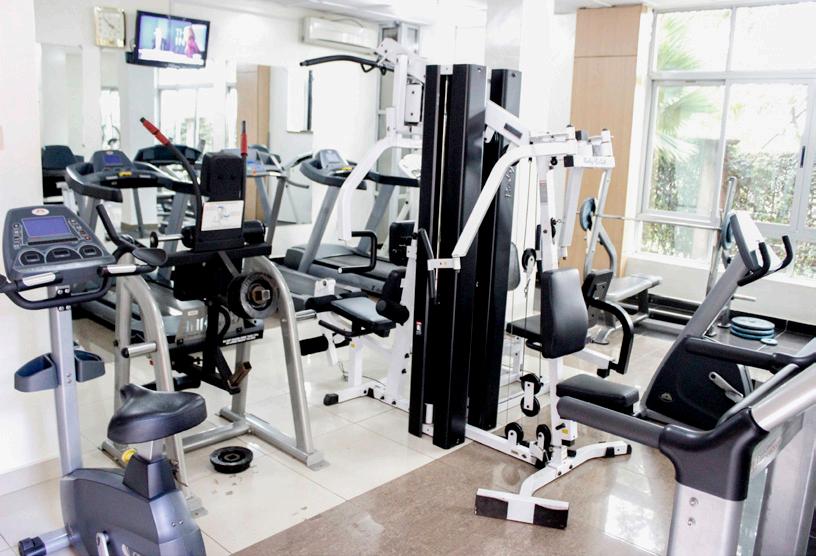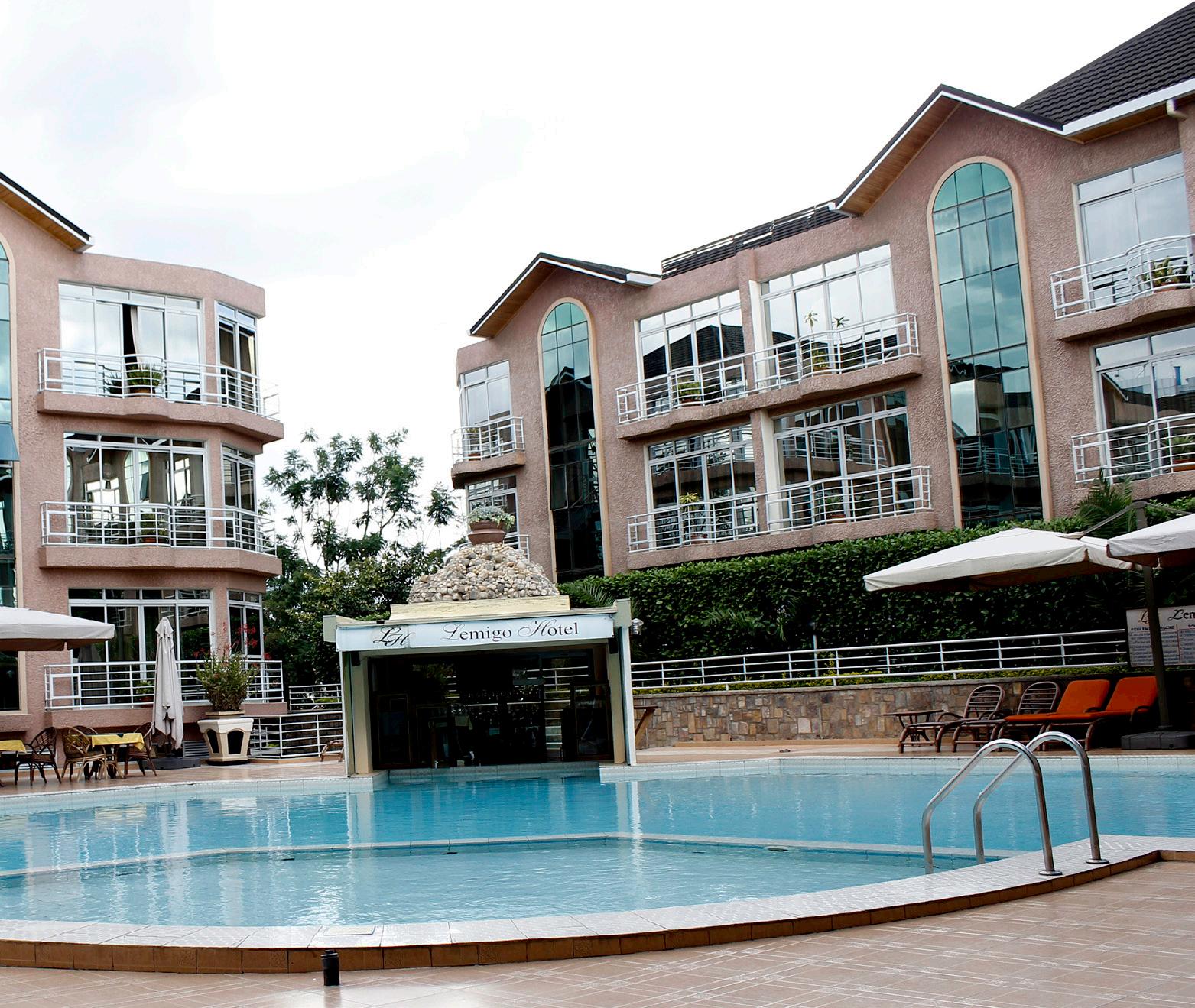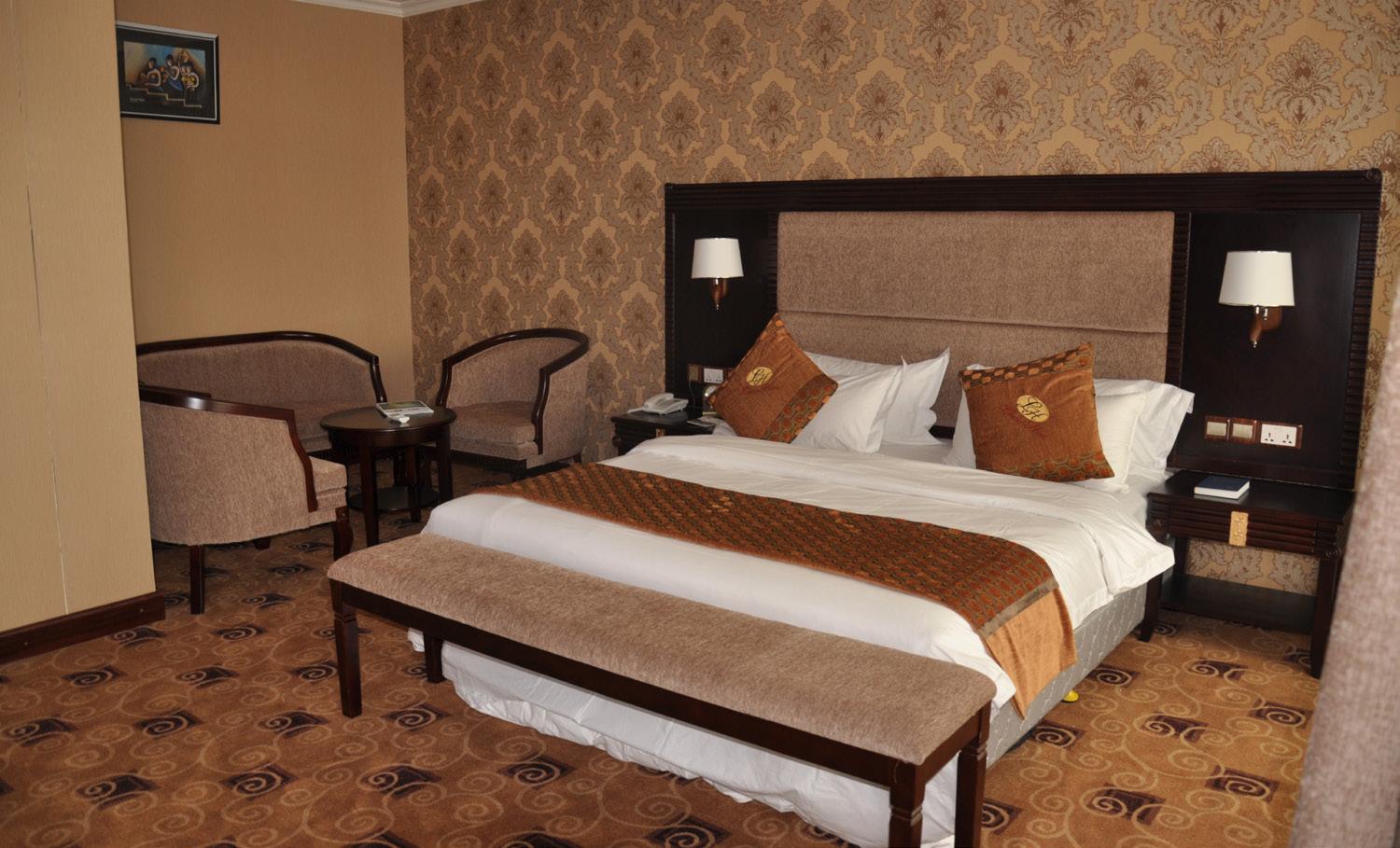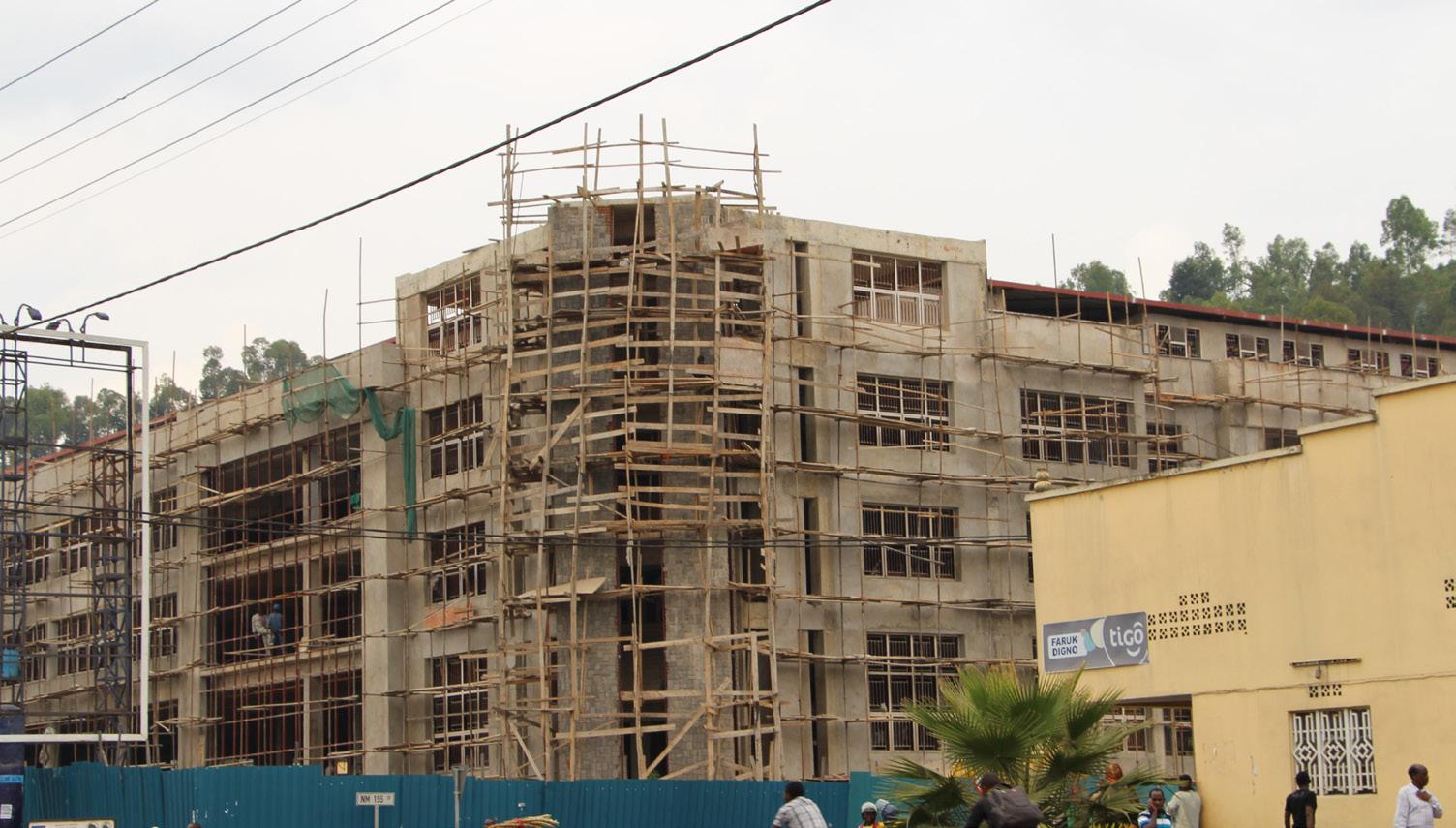
8 minute read
LEMIGO HOTEL: Providing everything right where it is needed
Lemigo Hotel, for best hospitality
Providing everything right where it is needed
Advertisement
Since its inauguration in September 2010, Lemigo hotel in the city of Kigali has excelled in providing a refreshing unique experience to Rwanda where it is a destination for many guests in the country. Lemigo hotel brings a distinctive business lifestyle that succeeds in combining luxurious living rooms together with functional specious office and conventions in Rwanda.
The hotel is facilitated with 176 rooms with high standard comfort, 4 restaurants including a VIP Lounge, 4 bars and more with beautiful open air space including one in the swimming pool itself, not forgetting 9 conference halls with capacity ranging from 20 to 1000 people. The meeting rooms, in addition to gaping the country’s increasing demand in accommodation of top business travelers, are set to satisfy the need for important international bodies and individuals attending conventions in Rwanda.
Apparently the hotel is well equipped with facilities to cater comprehensively for the needs of discerning business travelers, country diplomats, and tourists in an environment of luxurious resort living and absolute serenity.
ALSO AT LEMIGO
Meeting rooms; 6 big conference halls to accommodate between 300 and 1000 people, 1 conference hall that can be partitioned into rooms to accommodate smaller workshops/seminar groups with people ranging between 25, 50, 80, and 150. Packing; 150 vehicles inside the hotel and 50 free parking space surrounding the hotel compound.
THE NATION MAGAZINE Sports and health facilities; here with pride to offer a wide variety of body health facilities including a standard swimming pool, a gym, saunas, spa, and massage (the only payable at US $ 20/hour).
STRATEGICALLY SITUATED
Right on the main road, half way between the Kigali international airport and the center of Kigali city, where a guest will use less than 7 minutes drive to get to any of these two strategic business places, is the location of Lemigo hotel.

Privileged still, Lemigo hotel is incomparably close to a good neighborhood with most important government institutions such as the Ministry of Foreign Affairs and Ministry of Trade and Industry, government agencies such as Rwanda Revenue Authority-RRA, Rwanda Environmental Management AuthorityREMA, Rwanda Development Board-RDB, to mention but a few.
Lemigo site is advantaged with being close to most of the independent International organizations that serve as a link to civil society and the private sector in Rwanda. Such of this kind include the European Union Mission, United Nations Children’s Fund-UNICEF, the UN Food and Agricultural Organisation-FAO, and the World Health Organisation-WHO. Also in the neighborhood are bilateral bodies such as the US, Dutch, UK, South African Embassies and International NGOs like World Vision, Catholic Relief Services, CRS, Care International, Action Aid, etc.
All the hotel guests have the incomparable advantage of having a good choice



of a variety of entertainment during their free time including a wide selection of international restaurants and nice pubs located between Nyarutarama and Kimihurura. The hotel is located in a very safe area where guests, upon their will, have the opportunity to organize individually or in groups, jogging and walking to visit surrounding beautiful places.

STANDARDS
Lemigo is proudly a 4-Star Hotel Category. Nevertheless, the general standards found in this hotel (including spacious rooms, basic room commodities such king size beds, high speed internet connection, mini bars, flat screen Tvs, Air conditioners and assorted high quality gadgets such as safety boxes, hair dryers, iron boxes, etc, gives it the strength to position in such a category with a level of a comfort people usually pay for in high category hotels.
Lemigo has a post modern and original architectural design! The top fashion material used to build the hotel, combined with a finishing that has a modern architectural design is perfectly set for a marriage between the historical classic construction and impressive futuristic styles leave in every visitor a deep feeling of amazement and sense of profound vitality the buildings are breathing. Finally, a countless number of visitors express a real admiration for such hidden jewellery in Kigali’s quiet residential area.
STILL YOUNG BUT IMMACULATE

Only five years counting today but Lemigo is already accommodating people and organizations from different international standards. Several national and international conferences with guests and delegates from all over the world have been hosted in this gorgeous business central place.
Much as the hotel is new in Rwanda market, well qualified staff conducted by a very organized and committed management enables the hotels to quickly keep pace despite all the turbulences unavoidably affecting all big affecting all big companies especially in the hospitality sector that are still young in this country. Inspite of the young age the hotel can still proud of its achievements within this short but rich period of activity.
Consequently, the acquired experience together with the all resources that have been dedicated to date plus the young, creative and flexible management team, has enabled the hotel to seize each day as an opportunity to position itself as a potential company that is optimistic to take the leading position in this industry.
RWANDA HOUSING AUTHORITY
A glance at Rwanda’s Housing sector

The housing industry in Rwanda is still uneven with much of the construction being undertaken by private under- capitalized firms and individuals as opposed to large-scale property developers. Looking at the settlement system in Rwanda today, one realizes that 7% of it, is planned settlement while the rest of 93% is catered for by impulsive settlement. In most cases individual property developers are given plots of land and they build according to their convenience, using plans of their own interest, and according to their financial capacity, but not minding much about the areas where they build. The result of this is definitely slum areas characterized by bad and small structures build near or next to fine big building yet in good priced areas where infrastructure is hard to provide.
However, this will soon become a story to tell since planned estate buildings are gradually sprouting up through both private and public property developers. Big projects are being done and a better settlement system is underway. Much as there is this kind upward trend, the demand in the market is still underserved.
The Rwanda housing sector has strategies to address the cost of construction at all levels. The crucial issue is that building materials and skilled resource personnel are imported and this is seemingly very expensive. According to survey, by UN Habitat, IFC, together with government organs concerned with housing need in Rwanda, there is big market despite the fact that repayment capacity remains a challenge. Yet challenging too, is the issue of resolving limited access to long-term financing by lending.
WAY FORWARD
As the National Investment Strategy places much emphasis on support of the private sector in infrastructure
development, Rwanda’s housing sector has a beacon of hope as more and better planned estate development continues to show up especially in big cities and major towns. The development of the Urban Master plan and the construction of basic infrastructure on



sites will enable investors to orient their investments.
The Rwanda Urban Housing policy seeks to execute a number of policy actions. Several of them have been executed while others are in the pipeline. These include, among many: Develop programs aimed at providing urban hosing to a cross-section of the over growing population. This will definitely call for more construction projects with planned estates on allotted sites.
The government of Rwanda entails to establish minimum standards in the construction of housing with respect to construction codes and provision of ample basic facilities such as water and sanitation, access to reliable power sources and basic social services within easy reach of residential areas. As a policy action too, the government provides the legal and regulatory framework to encourage private sector participation in the development of urban housing, in otherworld’s the development of housing estates.
Other actions in place include: ∫ Facilitate the development of housing stock in order to cater for increased demand for ownership and short-term occupation. ∫ Establish ‘owner-copier’ housing under affordable mortgage schemes guaranteed by employers, both private and public. ∫ Develop and establish tax incentives schemes to encourage people to obtain housing loans. ∫ Facilitate the access of housing finance for low and middle income earners. ∫ Establish guidelines on the upgrading of informal supplements and put in place regulatory measures to ensure that expropriations if required are carried out in line with internationally acceptable norms. ∫ Decentralize the registration of land tittles to ease the acquisition of land plots. The government has made all efforts to put in place a favorable investment regime in order to attract foreign direct investment. The investment code enhances the competitiveness of Rwanda as an investment hub which leads to quality production in goods and services.













